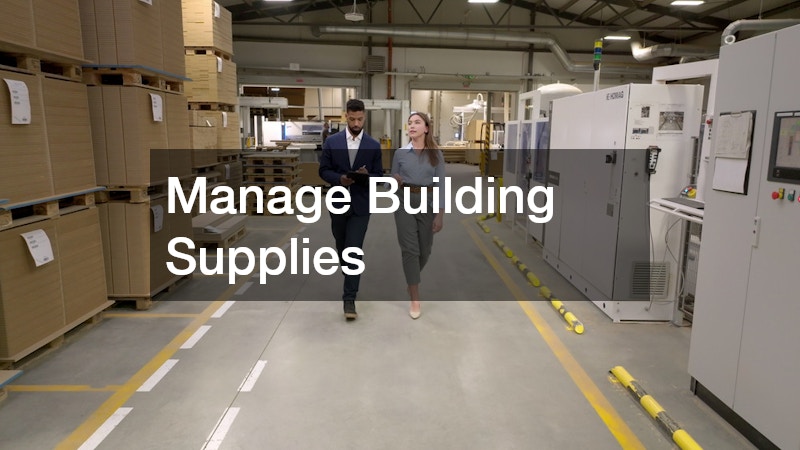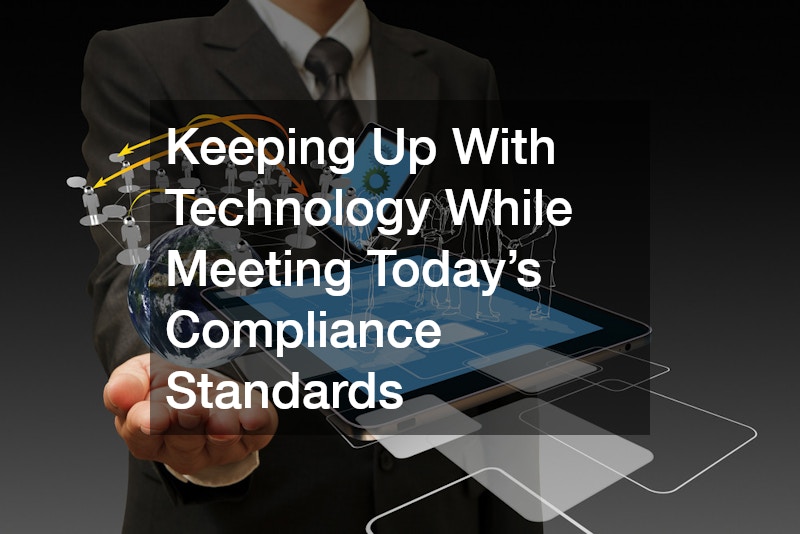In today’s fast-paced business environment, staying ahead with the latest technology is no longer optional—it’s essential. Companies across industries must adopt innovative tools to remain competitive while simultaneously navigating increasingly complex regulatory landscapes. From facility management to financial institutions, every sector faces the challenge of integrating modern solutions without compromising compliance. Leveraging corporate technology solutions allows businesses to streamline operations, monitor performance, and maintain regulatory adherence with minimal disruption. Businesses managing physical infrastructure, such as buildings and mechanical systems, find themselves particularly affected. Upgrading automatic door repair systems or monitoring septic systems requires technology that enhances operational efficiency while meeting stringent safety and health standards. Organizations handling sensitive data, such as credit union data processing, must ensure information is stored, accessed, and transmitted according to rigorous compliance regulations. Corporate technology results bridge the gap between operational improvement and regulatory adherence, allowing companies to reduce risks while maximising productivity.
The integration of technology also extends to essential services like AC repair, building material deliveries, and building materials management. Companies can leverage modern solutions to schedule maintenance, optimise logistics, and track inventory, ensuring that operational standards are met and compliance obligations are fulfilled. Similarly, commercial general contractors and window installers benefit from digital tools that improve project oversight, documentation, and regulatory reporting. Corporate technology solutions enable these professionals to execute complex tasks efficiently while demonstrating adherence to local, state, and federal regulations. Businesses increasingly turn to corporate technology answers to incentivize employees, manage projects, and maintain structural integrity in facilities. Implementing business incentives and ensuring safe building structural repair practices can be effectively monitored and managed through integrated platforms combining data analytics, workflow management, and compliance tracking. Real-time reporting, automated alerts, and predictive analytics allow managers to make informed decisions while staying within regulatory frameworks. Whether scheduling preventive AC repair or tracking building material deliveries, corporate technology results enhance both operational efficiency and regulatory confidence.
Upgrade Door Tech
Upgrading automatic door repair systems is essential for businesses looking to improve security, efficiency, and accessibility. Modern automatic doors integrate smart sensors, remote monitoring, predictive maintenance software, and even IoT-enabled connectivity, allowing organizations to reduce downtime, prevent mechanical failures, and maintain compliance with safety regulations. Corporate technology solutions provide the ability to analyze performance data over time, predict maintenance needs, and integrate with broader facility management platforms. This level of oversight ensures that doors remain operational at all hours, reducing liability for businesses while improving the experience for employees and customers. For example, commercial office buildings implementing these systems can track door cycles, detect abnormal patterns, and schedule service automatically. Corporate technology resolutions also allow for digital logs and compliance reports to be generated for audits, ensuring full regulatory transparency. In addition, advanced access control features can integrate with security systems to ensure that only authorized personnel can access specific areas, aligning with OSHA and ADA compliance standards. This proactive approach prevents costly downtime, mitigates risk, and positions businesses to respond quickly to any operational or regulatory issues.
Monitor Septic Systems

Monitoring septic systems is a critical aspect of facilities management, particularly for businesses that rely on on-site wastewater management. Corporate technology solutions now provide smart sensors, real-time monitoring dashboards, automated alerts, and predictive analytics to track septic tank levels, detect blockages, and schedule timely maintenance. These tools reduce the risk of environmental contamination, fines, or costly system failures while ensuring operational continuity. For example, property management companies can use cloud-based platforms to consolidate data from multiple properties, detect irregularities in tank performance, and automatically generate maintenance schedules. Corporate technology results also support record-keeping for regulatory inspections, ensuring compliance with local and federal wastewater management standards. Integration with other building management platforms allows managers to coordinate septic system monitoring with overall facility operations, enhancing efficiency and sustainability. Proactive monitoring helps businesses identify inefficiencies, prevent accidental overflows, and manage maintenance costs more effectively, ensuring that compliance requirements are met without disrupting daily operations.
Secure Credit Data
Protecting sensitive financial information is critical in credit union data processing, especially as cyber threats increase in sophistication. Corporate technology solutions provide robust encryption, automated backups, access controls, and audit trails, ensuring that transactions and member records remain secure while meeting stringent regulatory standards such as GLBA and PCI DSS. Real-time monitoring helps prevent unauthorized access, data breaches, and potential financial liability. Credit unions leveraging these solutions can offer secure online and mobile banking while maintaining regulatory compliance. Corporate technology answers allow organizations to generate detailed compliance reports, automate access audits, and maintain an immutable log of all data processing activities. This not only protects member information but also demonstrates a commitment to due diligence and operational integrity. Furthermore, integrating cybersecurity protocols with corporate technology solutions can help detect anomalies before they escalate into larger threats, creating a proactive compliance culture across the organization.
Improve AC Service

Efficient AC repair is essential for maintaining indoor air quality, comfort, and regulatory compliance in commercial and residential properties. Corporate technology solutions now allow for predictive maintenance, real-time monitoring, and automated scheduling of repairs, helping facilities teams reduce emergency costs and optimize energy consumption. For example, buildings using IoT-enabled sensors can detect airflow inconsistencies, temperature fluctuations, or pressure changes that indicate a need for service. Corporate technology results analyze this data, alert technicians, and schedule preventive AC repair, minimizing downtime and ensuring that HVAC systems meet energy and safety compliance standards. Advanced reporting tools can also provide historical data for audits, demonstrating adherence to regulations and supporting sustainability goals. Incorporating smart controls and AI-driven predictive models ensures not only compliance but also long-term efficiency improvements, reducing both operational costs and environmental impact.
Track Material Delivery
Tracking building material deliveries efficiently is crucial for construction and renovation projects to meet deadlines, manage budgets, and maintain compliance. Corporate technology solutions streamline logistics, provide real-time updates, optimize scheduling, and maintain detailed delivery records. Construction companies can integrate GPS tracking and inventory management systems to verify shipments, coordinate supplier schedules, and track delays automatically. Corporate technology answers allow teams to document delivery statuses, track discrepancies, and provide digital reports for audits or inspections. This level of oversight reduces miscommunication, minimizes errors, and ensures timely availability of critical materials. Moreover, real-time tracking improves decision-making, allowing managers to reroute deliveries, adjust procurement schedules, and maintain project timelines without compromising compliance with contractual or regulatory standards.
Manage Building Supplies

Effective management of building materials is essential to reduce waste, control costs, and meet regulatory standards. Corporate technology solutions enable businesses to track inventory, monitor usage patterns, and automate replenishments, ensuring that materials are available when needed and comply with safety regulations. Digital platforms provide real-time insights into stock levels, expiration dates, and storage conditions, helping businesses prevent the use of outdated or unsafe materials. Beyond basic inventory tracking, these solutions can integrate with procurement systems to automatically reorder materials based on project schedules, historical usage, and predictive demand analytics, reducing the risk of overstocking or stockouts.
A construction firm managing multiple sites can leverage corporate technology results to consolidate material data across all locations, generate alerts for low stock, and maintain logs for inspections. These tools also enable detailed reporting on material usage, allowing project managers to identify inefficiencies, adjust workflows, and optimize allocation of resources. In addition, corporate technology solutions can track compliance with safety and environmental regulations, ensuring that hazardous materials are handled and stored properly and that documentation is readily available for audits.
Advanced systems can also support sustainability initiatives by monitoring material waste, tracking recycling efforts, and identifying opportunities to reuse or repurpose resources. By providing a comprehensive overview of inventory from procurement to usage and disposal, businesses can minimize waste, reduce costs, and enhance overall operational efficiency. Furthermore, these solutions improve collaboration across teams, allowing warehouse staff, site managers, and procurement officers to share real-time data, coordinate deliveries, and resolve issues quickly.
Ultimately, integrating corporate technology solutions into building material management allows organizations to maintain transparency, demonstrate regulatory compliance, and support sustainability goals while optimizing operational efficiency. Companies that adopt these tools not only reduce financial and environmental risks but also create a more organized, efficient, and accountable supply chain, which contributes to smoother project execution and long-term business success.
Streamline Contractors
Commercial general contractors manage multiple projects, subcontractors, and compliance obligations simultaneously. Corporate technology solutions provide comprehensive project management, scheduling, communication, and reporting tools that enhance operational efficiency while ensuring regulatory adherence. Contractors can track progress, generate automated compliance reports, and coordinate safety inspections across multiple sites. For example, a commercial general contractor managing large-scale construction projects can use corporate technology results to monitor deadlines, allocate resources efficiently, and maintain complete documentation for inspections or audits. Integrating safety compliance modules ensures that all contractors and subcontractors follow regulatory requirements, reducing liability and improving project outcomes. The result is a streamlined operation that meets client expectations while maintaining full transparency for regulatory authorities.
Enhance Window Installs

Window installers benefit from digital technology that improves accuracy, safety, and regulatory compliance. Corporate technology solutions enable teams to measure, plan, and schedule installations efficiently while tracking material usage and maintaining quality standards. Real-time monitoring and reporting help identify potential issues before they become costly problems. Installers can use digital measurement tools, project management software, and compliance platforms to coordinate multiple jobs, track installation timelines, and maintain documentation for regulatory review. Corporate technology solutions allow teams to maintain a clear audit trail, demonstrate adherence to building codes, and ensure that all installations meet safety and operational standards. Additionally, these tools improve client satisfaction by minimizing delays, reducing errors, and ensuring consistent, high-quality results across all projects.
Offer Business Incentives
Business incentives are critical for motivating employees, improving performance, and supporting compliance initiatives. Corporate technology results provide platforms to track incentive programs, monitor participation, and measure effectiveness, all while ensuring adherence to internal governance and financial regulations. Organizations can automate rewards, generate reports, and identify trends that improve engagement and compliance. Digital tracking ensures fairness and transparency in incentive programs, while corporate technology solutions provide analytics that help companies align incentives with operational goals and regulatory obligations. These tools foster a motivated workforce, improve productivity, and create a culture of accountability that supports both performance and compliance.
Repair Structures Safely
Ensuring building structural repair is performed safely and meets compliance standards is critical for operational integrity and occupant safety. Corporate technology answers provide tools for planning, risk assessment, scheduling, and documentation of structural repairs. Construction teams can use digital inspection platforms to track repair progress, manage materials, and maintain audit-ready records for regulatory purposes. These solutions improve project efficiency, mitigate safety risks, and ensure adherence to building codes. By integrating corporate technology solutions into structural repair workflows, organizations can maintain full accountability, document compliance efforts, and demonstrate a proactive approach to safety and regulatory adherence.
Keeping up with technology while meeting today’s compliance standards is a critical component of modern business success. Corporate technology results empower organizations to streamline operations, improve efficiency, and maintain regulatory adherence across all operational areas. From automatic door repair and septic systems to credit union data processing, AC repair, building material deliveries, and building materials management, these tools support real-time monitoring, predictive analytics, and automated reporting to enhance both operational and compliance performance.
Contractors and service providers, including commercial general contractors, window installers, and teams performing building structural repair, benefit from digital platforms that facilitate project oversight, task tracking, and safety compliance while creating verifiable audit trails. Similarly, managing building materials and implementing business incentives is more efficient, transparent, and measurable with corporate technology solutions, fostering accountability, engagement, and regulatory confidence.
Proactive compliance management is another significant advantage, allowing organizations to identify issues before they escalate, prevent violations, and demonstrate diligence to regulators. By integrating corporate technology answers across all operations—from automatic door repair to building structural repair—companies achieve operational excellence while mitigating risk. This balanced approach ensures that innovation does not compromise safety, security, or compliance standards.
Ultimately, keeping up with technology while meeting today’s compliance standards allows organizations to balance operational efficiency, innovation, and responsibility. Businesses adopting corporate technology solutions gain a competitive advantage, improve workflow transparency, and strengthen regulatory compliance, positioning themselves as forward-thinking, responsible enterprises capable of thriving in an increasingly complex and regulated business landscape.
